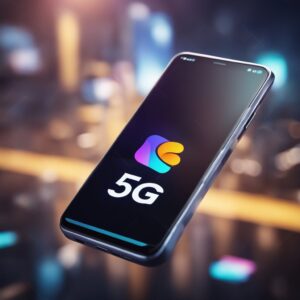The Impact of 5G on Mobile Gaming: Unlocking New Levels of Connectivity and Experience
Mobile gaming has taken a giant leap with the arrival of 5G technology. With faster speeds and lower latency, players can expect a smoother and more immersive gaming experience. This new network means less lag time, clearer graphics, and the ability to connect with friends seamlessly, changing the way people play games on their phones.
As mobile games continue to grow in complexity and quality, 5G’s capabilities will play a crucial role in shaping the future of gaming. Players can now dive into rich, multiplayer worlds without the interruptions that used to plague online gaming. This shift not only enhances enjoyment but also opens doors for new game designs and experiences.
The adventure doesn’t stop here. As developers harness the power of 5G, the possibilities for innovation are endless. Players can look forward to a bright future where mobile gaming is not just a pastime but a thrilling encounter that pushes beyond the limits of traditional gaming.
Evolution of Mobile Gaming
Mobile gaming has grown significantly over the years. The changes in network technology have played a key role in shaping the mobile gaming experience. This section will cover how mobile gaming developed from earlier network generations to the current impact of 5G.
From 2G to 4G: A Brief History
The journey of mobile gaming began with 2G technology in the 1990s. This early phase allowed simple games like Snake on basic phones. Players enjoyed these titles due to their accessibility.
With the arrival of 3G in the early 2000s, mobile gaming started to expand. 3G offered faster internet speeds and better graphics. Games like Angry Birds became popular, attracting millions of players.
4G came next and transformed mobile gaming further. The increased speed and reduced latency allowed for multiplayer and more complex games. Titles like Fortnite and PUBG Mobile emerged, providing immersive experiences. Players could connect, interact, and compete in real-time, enhancing the overall excitement of gaming on mobile devices.
The Emergence of 5G Technology
5G technology is making waves in mobile gaming. It offers much faster speeds than 4G, with lower latency. This means players can enjoy smoother gameplay and reduced lag.
With 5G, the potential for cloud gaming has grown. Players can stream high-quality games without needing powerful hardware. This change opens up gaming to a broader audience, allowing more people to access advanced gaming experiences.
Moreover, 5G supports more devices connected at once. This allows for bigger gaming communities and new social experiences. Features like virtual reality (VR) and augmented reality (AR) can be better integrated, taking mobile gaming to the next level.
5G is setting the stage for the next generation of mobile gaming, making it an exciting time for players everywhere.
Understanding 5G Technology
5G is the latest advancement in mobile network technology. It brings faster speeds, better connectivity, and lower latency. These improvements are important for users, especially in mobile gaming.
Key Features of 5G
5G has several key features that set it apart:
- Speed: It can be up to 100 times faster than 4G, allowing quick downloads and smooth gaming experiences.
- Low Latency: 5G reduces delays in communication between devices. Latency can drop to as low as 1 millisecond, which is crucial for real-time gaming.
- Higher Capacity: 5G can support more devices at once. This helps prevent slowdowns, especially in crowded areas like stadiums or concerts.
- Improved Reliability: Users can expect a more stable connection, which enhances gameplay by reducing interruptions.
These features make 5G a game-changer for mobile users.
How 5G Differs from Previous Generations
5G differs from earlier generations in several important ways:
- Technology Architecture: 5G uses a new architecture that includes more antennas and advanced technologies like beamforming. This helps target signals directly to users.
- Frequency Bands: 5G operates on a wider range of frequencies. It includes both low and high bands, providing flexibility in coverage and speed.
- User Experience: Unlike 4G, which struggles with congestion, 5G can handle many users simultaneously without slowing down.
These differences greatly enhance the experience for players and other users.
5G and Gaming Experience
The arrival of 5G technology brings notable changes to the gaming experience. Improved speed, reduced lag, and better graphics are some benefits that gamers can expect to enjoy.
Enhanced Speed and Lower Latency
5G networks offer much faster data speeds compared to previous generations. This enables players to download games and updates quickly, reducing waiting times significantly.
Low latency is another key feature. It refers to the delay between player actions and the game’s response. With 5G, this delay is often less than 20 milliseconds. This quick response time makes gameplay smoother and more enjoyable, especially in fast-paced games.
Players can experience real-time interactions without frustrating lags. This immediate feedback is essential for competitive gaming, where every millisecond can impact performance.
Revolutionizing Multiplayer Gaming
5G has the potential to transform how people play multiplayer games. With its enhanced speed and low latency, players can join matches with others around the world without delay.
Another benefit of 5G is the ability to connect multiple devices seamlessly. This allows for larger multiplayer sessions, accommodating more players than ever before. Game developers can create more complex and interactive experiences.
Players can also enjoy improved communication. Voice chat and video streaming features work better, making team coordination easier. The social aspect of gaming is strengthened as friends can connect and play together effortlessly.
Impact on Game Streaming Services
5G technology greatly enhances game streaming services. Players can stream high-quality games directly to their mobile devices without needing to download them. This opens up a new world of possibilities.
With 5G, gamers can enjoy seamless streaming with fewer interruptions. Services such as Google Stadia and NVIDIA GeForce NOW can stream graphically rich games in real-time.
The increased bandwidth of 5G allows for high-definition graphics and immersive sound. Players can enjoy console-quality gaming experiences on their phones. This evolution makes gaming more accessible and enjoyable, regardless of where one is.
Benefits for Game Developers
5G technology brings new opportunities for game developers. It offers faster speeds and lower latency, allowing for more creativity in game design. Developers can create more complex games and enhance player experiences in exciting ways.
Possibilities for Innovative Game Design
With 5G, developers can design games with bigger worlds and richer details. Higher data speeds allow for advanced graphics and real-time updates. This means players can explore larger environments without long loading times.
Developers can also integrate features like cloud gaming. This lets players enjoy high-quality games on less powerful devices. It makes gaming more accessible, attracting a wider audience.
Exploiting 5G Capabilities for Immersive Experiences
5G supports new technologies that enhance player immersion. Virtual reality (VR) and augmented reality (AR) can benefit from fast connections. This results in smoother experiences that feel more lifelike.
Multiplayer gaming also improves significantly with 5G. Players can enjoy real-time interactions with minimal lag. This can lead to more engaging and competitive gaming environments.
Game developers can leverage these features to create unforgettable experiences. The potential to engage players in new ways excites both creators and gamers alike.
Challenges and Considerations
5G brings many benefits for mobile gaming, but it also presents challenges. Players should be aware of issues like network coverage, the need for new hardware, and concerns about security.
Network Coverage and Accessibility
5G networks are not everywhere yet. This can create problems for gamers in rural or less populated areas. They might not have access to high-speed internet that 5G promises.
Those in cities often see better coverage, but even here, connections can vary. Dense buildings or trees can block signals. Gamers might experience lag or disconnections if they are far from a 5G tower.
To really enjoy 5G gaming, players need reliable access. This means that those in less connected areas might face challenges. They may need to wait longer for 5G networks to reach them.
Hardware Requirements and Optimization
With 5G’s fast speeds, older devices may struggle. Many mobile games are being developed for 5G technology. This means that phones and tablets need to support new features.
Gamers might find that higher performance devices can provide a better experience. Upgrading to a 5G-capable device may be necessary for optimal gaming.
Additionally, game developers must optimize their apps for 5G. This includes making sure games run well on various hardware. If the game doesn’t use 5G properly, players might not see the benefits.
Security and Privacy Concerns
5G technology also brings security issues that gamers must consider. Faster speeds can make it easier for hackers to attack networks. This raises concerns about data privacy.
Players should be cautious when using public Wi-Fi. Many will seek faster connections, but those networks can be insecure. Avoiding sensitive actions on public networks is wise.
It’s important to use security features, like VPNs, when gaming online. Keeping devices updated also helps protect against threats. These steps can help maintain privacy while enjoying mobile gaming on 5G.
Case Study: The Impact of 5G on Mobile Gaming – PUBG Mobile
Introduction
PUBG Mobile is a prime example of how 5G technology can revolutionize mobile gaming. This battle royale game, developed by Tencent Games, has become one of the most popular mobile games globally, attracting millions of players with its immersive gameplay and competitive nature. The introduction of 5G has significantly enhanced the gaming experience for PUBG Mobile players, demonstrating the potential of this advanced technology.
Enhanced Connectivity and Reduced Latency
One of the most significant benefits of 5G for PUBG Mobile is enhanced connectivity. 5G networks offer significantly lower latency compared to 4G, which is crucial for real-time multiplayer games. In PUBG Mobile, where every millisecond counts, reduced latency means faster response times, smoother gameplay, and a more competitive edge. Players can now enjoy a more seamless gaming experience, with fewer interruptions and lag.
Improved Graphics and Performance
5G technology also enables better graphics and overall game performance. PUBG Mobile players with 5G connectivity can experience higher resolution textures, more detailed environments, and smoother animations. This improvement in visual fidelity makes the game more immersive and visually appealing, enhancing the overall gaming experience. The increased bandwidth provided by 5G allows for these high-quality graphics to be delivered without compromising performance.
Cloud Gaming Integration
Another significant impact of 5G on PUBG Mobile is the potential for cloud gaming integration. With 5G’s high-speed data transfer capabilities, players can stream games directly from the cloud, reducing the need for powerful hardware on their devices. This means that even players with mid-range or older smartphones can enjoy PUBG Mobile with high-quality graphics and performance, as the heavy lifting is done on remote servers. This democratizes access to top-tier gaming experiences and expands the game’s reach.
Real-time Updates and Social Features
5G also enhances the social aspects of PUBG Mobile. Real-time updates and in-game events can be delivered more efficiently, keeping the player base engaged with fresh content. Additionally, the improved connectivity supports enhanced social features such as live streaming, in-game voice chat, and quick matchmaking. Players can easily connect with friends and other gamers around the world, creating a more connected and interactive community.
Conclusion
The impact of 5G on PUBG Mobile illustrates the transformative potential of this technology in the mobile gaming industry. Enhanced connectivity, reduced latency, improved graphics, and the integration of cloud gaming are just a few ways 5G is elevating the gaming experience. As 5G continues to roll out globally, we can expect even more innovative developments and improvements in mobile gaming, unlocking new levels of connectivity and experience for players everywhere.
The Future of Mobile Gaming
New technology shapes the future of mobile gaming. With the rise of 5G, players can expect faster speeds and improved experience. This section explores upcoming trends and how developers can prepare for this new landscape.
Predictions and Trends
The future of mobile gaming will see a mix of advanced graphics and immersive experiences. As 5G networks expand, developers will create games that push the limits of what is possible.
Key trends include:
- Cloud Gaming: This allows players to stream high-quality games without needing powerful devices.
- Augmented Reality (AR): Games will become more interactive with AR, blending the real and virtual worlds.
- Cross-Platform Play: More games will support playing across different devices, enhancing social interaction.
These trends point toward a more connected and engaging gaming experience.
Preparing for a 5G Dominated Landscape
Developers must adapt to fully use 5G’s capabilities. They should focus on optimizing games for better performance on high-speed networks.
Key preparation strategies:
- Invest in Multiplayer Functionality: Seamless online play is essential with 5G’s low latency.
- Enhance Graphics and Audio: Players will expect top-tier visuals and sound, so quality must improve.
- Regular Updates: Games will need frequent updates to add new features and maintain player interest.
By embracing these strategies, developers can ensure their games thrive in the 5G era.
5G and Gaming Ecosystem
The introduction of 5G technology is changing the gaming ecosystem significantly. Faster speeds and lower latency open up new opportunities for game development, distribution, and gameplay experiences. This transformation affects publishers, distributors, game platforms, and the growing field of cloud gaming.
Impact on Publishers and Distributors
5G allows publishers and distributors to reach gamers more effectively. Higher speeds mean that updates and downloads happen quickly. This can improve user satisfaction, as players spend less time waiting for updates.
Publishers can also experiment with larger game files and richer content. With fast connections, they can offer high-definition graphics and more detailed worlds. This shift encourages innovation, leading to better games overall.
Additionally, real-time feedback becomes possible. This helps publishers make necessary changes based on player input almost instantly. They can adjust gameplay elements, fix bugs, and improve user experience more efficiently.
Changing Dynamics for Game Platforms
5G alters how game platforms operate. Traditional consoles and PCs might face more competition from mobile devices. Mobile gaming becomes more appealing with faster internet speeds, allowing intensive games to run smoothly.
Moreover, platforms can introduce new features like augmented reality (AR) and virtual reality (VR) experiences. 5G supports the high data demands of these technologies, making cutting-edge gameplay accessible to more players.
The ability to connect and play with others in real-time also enhances the multiplayer experience. Gamers can enjoy richer interactions without lag. This can lead to larger communities surrounding specific games.
Role of Cloud Gaming
Cloud gaming thrives on the capabilities of 5G. Players can stream games directly without needing powerful hardware. This eliminates barriers such as expensive gaming consoles and high-end PCs.
With cloud gaming, players can access their favorite games anywhere, as long as they have a 5G connection. This flexibility creates a more inclusive gaming environment.
Low latency connections mean that gameplay can feel seamless. This is crucial for competitive gaming, where every millisecond counts. As cloud gaming grows, players might prioritize mobile devices over traditional systems due to convenience.
Consumer Perspectives
Consumers are excited about the arrival of 5G and its potential to enhance mobile gaming. Two main areas of interest are user experiences and the factors that might influence how quickly people adopt this new technology.
Anticipated User Experiences
With 5G, gamers expect improved experiences. Lower latency means less lag, allowing for smoother gameplay. This is especially important for competitive games where every millisecond counts.
- Better Graphics: 5G enables higher-quality graphics, enhancing visual details and realism.
- More Players: Faster connections can support more players online, making multiplayer experiences richer.
- Cloud Gaming: Users look forward to game streaming without interruptions, making gaming more accessible.
These changes can greatly influence how consumers enjoy their favorite games.
Adoption Barriers and Drivers
While the excitement for 5G is strong, some barriers still exist. Cost is a significant concern. Upgrading to a 5G plan can be pricey, and not everyone has access to 5G networks yet.
- Device Compatibility: Many current devices may need upgrades for 5G, which adds to the cost.
- Network Availability: In some regions, 5G may not be available, limiting user access.
Yet, the promise of better gaming experiences and faster connections drives many to consider 5G. As infrastructure improves, adoption is likely to grow.
Case Studies and Success Stories
Many companies have embraced 5G for mobile gaming. This has led to exciting results.
Example 1: PUBG Mobile
PUBG Mobile is a prime example of how 5G technology can revolutionize mobile gaming. This battle royale game, developed by Tencent Games, has become one of the most popular mobile games globally, attracting millions of players with its immersive gameplay and competitive nature. The introduction of 5G has significantly enhanced the gaming experience for PUBG Mobile players, demonstrating the potential of this advanced technology.
Enhanced Connectivity and Reduced Latency: One of the most significant benefits of 5G for PUBG Mobile is enhanced connectivity. 5G networks offer significantly lower latency compared to 4G, which is crucial for real-time multiplayer games. In PUBG Mobile, where every millisecond counts, reduced latency means faster response times, smoother gameplay, and a more competitive edge. Players can now enjoy a more seamless gaming experience, with fewer interruptions and lag.
Improved Graphics and Performance: 5G technology also enables better graphics and overall game performance. PUBG Mobile players with 5G connectivity can experience higher resolution textures, more detailed environments, and smoother animations. This improvement in visual fidelity makes the game more immersive and visually appealing, enhancing the overall gaming experience. The increased bandwidth provided by 5G allows for these high-quality graphics to be delivered without compromising performance.
Cloud Gaming Integration: Another significant impact of 5G on PUBG Mobile is the potential for cloud gaming integration. With 5G’s high-speed data transfer capabilities, players can stream games directly from the cloud, reducing the need for powerful hardware on their devices. This means that even players with mid-range or older smartphones can enjoy PUBG Mobile with high-quality graphics and performance, as the heavy lifting is done on remote servers. This democratizes access to top-tier gaming experiences and expands the game’s reach.
Real-time Updates and Social Features: 5G also enhances the social aspects of PUBG Mobile. Real-time updates and in-game events can be delivered more efficiently, keeping the player base engaged with fresh content. Additionally, the improved connectivity supports enhanced social features such as live streaming, in-game voice chat, and quick matchmaking. Players can easily connect with friends and other gamers around the world, creating a more connected and interactive community.
Conclusion: The impact of 5G on PUBG Mobile illustrates the transformative potential of this technology in the mobile gaming industry. Enhanced connectivity, reduced latency, improved graphics, and the integration of cloud gaming are just a few ways 5G is elevating the gaming experience. As 5G continues to roll out globally, we can expect even more innovative developments and improvements in mobile gaming, unlocking new levels of connectivity and experience for players everywhere.
Example 2: Fortnite
Company: Epic Games
Result: The introduction of 5G technology to Fortnite has led to streamlined graphics and smoother gameplay. The improved bandwidth and lower latency provided by 5G networks have allowed Epic Games to enhance the visual quality and performance of the game on mobile devices. Players experience faster load times, more responsive controls, and a higher frame rate, which significantly improves the overall gaming experience.
Impact: The enhancements brought by 5G have had a positive effect on player engagement. Feedback from players indicates a high level of satisfaction with the 5G connections, noting the smoother and more visually appealing gameplay. This increased satisfaction has led to longer play sessions and a growing player base, as more gamers are attracted to the high-quality experience that Fortnite now offers on mobile platforms.
Example 3: Call of Duty: Mobile
Company: Activision
Result: For Call of Duty: Mobile, the implementation of 5G has resulted in enhanced multiplayer experiences and real-time updates. The low latency and high-speed connectivity of 5G networks enable players to engage in fast-paced, competitive matches with minimal lag and interruption. Additionally, real-time updates and content delivery have become more efficient, ensuring that players always have access to the latest game features and events.
Impact: The improvements brought by 5G have had a significant impact on player behavior. Reports indicate a 40% rise in competitive matches since the rollout of 5G, highlighting the increased interest and participation in multiplayer modes. Players appreciate the seamless and responsive gameplay, which has led to higher levels of engagement and satisfaction. The ability to experience high-stakes matches with smooth performance has solidified Call of Duty: Mobile‘s position as a leading title in the mobile gaming market.
5G has made mobile gaming more accessible and fun. The speed and stability of the network create better experiences for players.
Many game developers are now creating titles that take advantage of 5G technology. As more areas get 5G, these success stories may grow.
Conclusions and Final Thoughts
5G technology is changing mobile gaming in exciting ways. It offers faster speeds, lower latency, and better connectivity. This makes gaming smoother and more enjoyable.
Players can experience higher-quality graphics and realistic gameplay. The ability to download games quickly means less waiting time. This keeps players engaged and satisfied.
Key Benefits of 5G for Mobile Gaming:
- Faster Downloads: Games download in seconds instead of minutes.
- Improved Multiplayer Experience: Real-time interactions with friends more efficiently.
- Enhanced Graphics: Better visuals make games more immersive.
As 5G continues to spread, it can encourage new game development. Developers might create games that use the unique features of 5G. This could lead to more innovative gameplay experiences.
Challenges remain, such as the need for infrastructure and accessibility. Not everyone has access to 5G yet. However, as more areas gain coverage, the gaming community will likely thrive.
In the end, 5G is a promising advancement for mobile gaming. It opens doors to new possibilities and experiences. Players can look forward to more fun and engaging games in the future.



